Did you know that project managers (PMs) with high emotional intelligence (EQ) are about 11% more successful at managing processes, engaging stakeholders, avoiding scope creep, and efficiently using resources compared to PMs who lack EQ? [Source]
Emotional intelligent people can recognize, understand, and manage their emotions, as well as those of others.
EQ helps us communicate effectively, resolve conflicts, and navigate complex social situations. No wonder why emotional intelligence for project managers is is critical to success In project management.
It helps project managers build strong relationships with team members, stakeholders, and clients.
Research shows that emotional intelligence has a significant impact on project success. According to a study by the Project Management Institute, projects led by emotionally intelligent project managers are 2x as likely to be successful as those led by managers with lower EI.
Teams with high emotional intelligence have been found to have better communication, higher morale, and increased productivity.
Let’s explore the importance of emotional intelligence in project management. We will cover the components of EI and how they apply to project management.
You will also learn about the impact of emotional intelligence on communication, collaboration, risk management, and stakeholder management. We will discuss strategies for developing emotional intelligence in project managers and highlight real-world examples of successful project management through EI.
By the end of this article, you will have a better understanding of how emotional intelligence can enhance project management and how organizations can prioritize EI assessment and development for their project teams.

Understanding Emotional Intelligence in Project Management
Emotional intelligence involves skills that allow project managers to build strong relationships, manage conflicts, and lead teams effectively.
EI Components
Daniel Goleman defines the four components of emotional intelligence as self-awareness, self-regulation, social awareness, and relationship management.
In project management, self-awareness is critical to understanding one’s emotions, strengths, and limitations.
Self-regulation allows project managers to control their impulses and respond to challenges calmly and constructively.
Social awareness involves the ability to read and understand the emotions of others. And relationship management includes the skills necessary to communicate effectively, build trust, and inspire others.
How do these components of emotional intelligence apply to project management?
Self-awareness can help project managers understand their biases and preferences, and how these might affect their decision-making.
Self-regulation can help PMs manage stress and maintain focus during challenging situations. Using social awareness skills, a project manager can better understand the needs and perspectives of team members, stakeholders, and clients, and respond appropriately.
And relationship management can help project managers build strong relationships with team members and stakeholders, and inspire them to work towards project goals.
EQ vs IQ in Project management
The ever-lasting battle between EQ and IQ!
While IQ is important in project management, emotional intelligence is critical in enabling project managers to navigate complex social situations, build strong relationships, and lead teams effectively.
Emotional intelligence allows project managers to understand and manage their own emotions, as well as the emotions of others, and use this understanding to achieve project success.
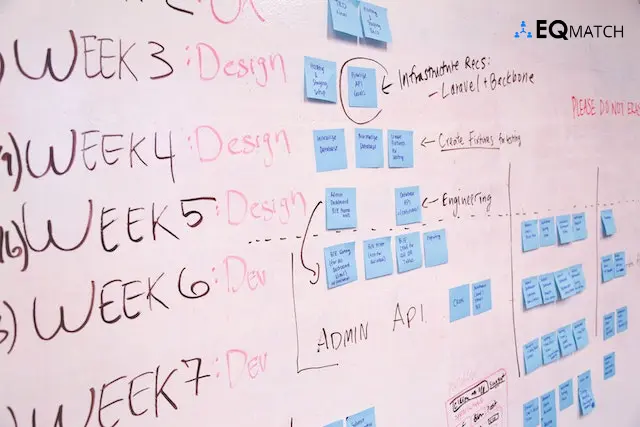
Why is Emotional Intelligence Important in Project Management?
Emotional intelligence (EI or EQ) has a significant impact on communication and collaboration within project teams. Project managers with high emotional intelligence are better equipped to communicate clearly and effectively, listen actively, and respond appropriately to feedback. They are also able to build trust and rapport with team members, creating a positive and productive team culture.
Communication & Collaboration
EQ improves communication and collaboration by enabling project managers to manage conflict effectively. Conflict is a common occurrence in project teams, and emotional intelligence allows project managers to manage conflict constructively and facilitate open communication among team members.
By listening actively and responding empathetically, project managers can de-escalate conflict and foster a collaborative team environment.
Project risk management
By being aware of their own emotions and those of team members, project managers can anticipate potential risks and take steps to mitigate them. EQ allows project managers to respond quickly and effectively to unexpected challenges, minimizing the impact on the project timeline and budget.
Project stakeholder management
Understanding the emotions and perspectives of stakeholders allows project managers to build stronger relationships and communicate more effectively. This can lead to increased stakeholder engagement and support, as well as improved project outcomes.
Team Morale
Project managers with high emotional intelligence can create a positive and supportive work environment that fosters creativity, innovation, and high performance.
Adapt to Change
Emotionally intelligent Project managers are better able to adapt to changes in project scope, timeline, and budget, and can lead their teams through times of uncertainty and ambiguity.
More and more HR leaders are recognizing the importance of EQ for long-term growth. No wonder emotional intelligence is becoming indispensable for the success of human resource management.

Developing Emotional Intelligence for Project Managers
How can one assess emotional intelligence in project managers?
Welcome to the world of Emotional Intelligence Assessments!
Such an assessment measures an individual’s emotional intelligence competencies and provides a report on areas of strength and areas for improvement. As discussed earlier, developing emotional intelligence in project managers is critical to their success.
Self-reflection, mindfulness practices, and seeking feedback from team members and stakeholders are some strategies for developing emotional intelligence.
Project managers can also develop their EQ by seeking out training and coaching opportunities, such as leadership development programs or emotional intelligence workshops.
Emotional intelligence training
Emotional intelligence training can help project managers develop their emotional intelligence competencies, such as self-awareness, self-regulation, social awareness, and relationship management. Training can also help project managers learn how to manage conflict effectively, build strong relationships with team members and stakeholders, and communicate more effectively.
Emotional Intelligence Assessment for Improving Project Management Performance
EQ assessments and pre-employment tests are valuable tools for identifying project managers with high Emotional Intelligence (EI).
An emotional intelligence assessment like EQMatch measures one’s ability to identify and manage emotions, as well as their ability to read and respond to the emotions of others. Using such an assessment, businesses can identify project managers who are likely to excel in managing complex projects.
Here is how you can leverage EQMatch Emotional Intelligence Assessment for hiring Project managers:
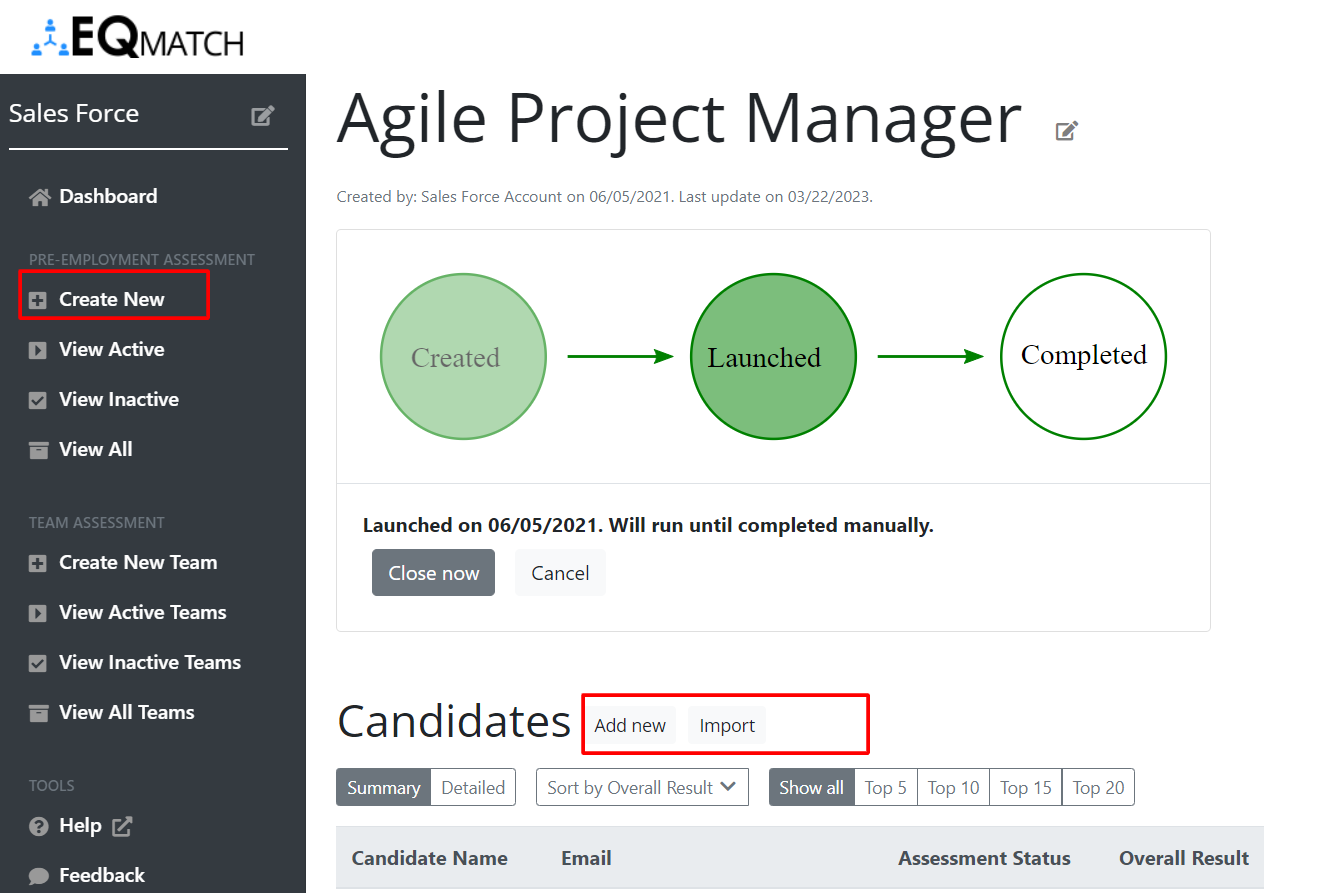
Once you create an account with EQMatch, you would create a new assessment. The next step is to add the candidates to the solution.
Once you send the assessment invite to the candidates, and they complete the assessment, your EQMatch dashboard would populate with the assessment results.
You can either look at the summary view:
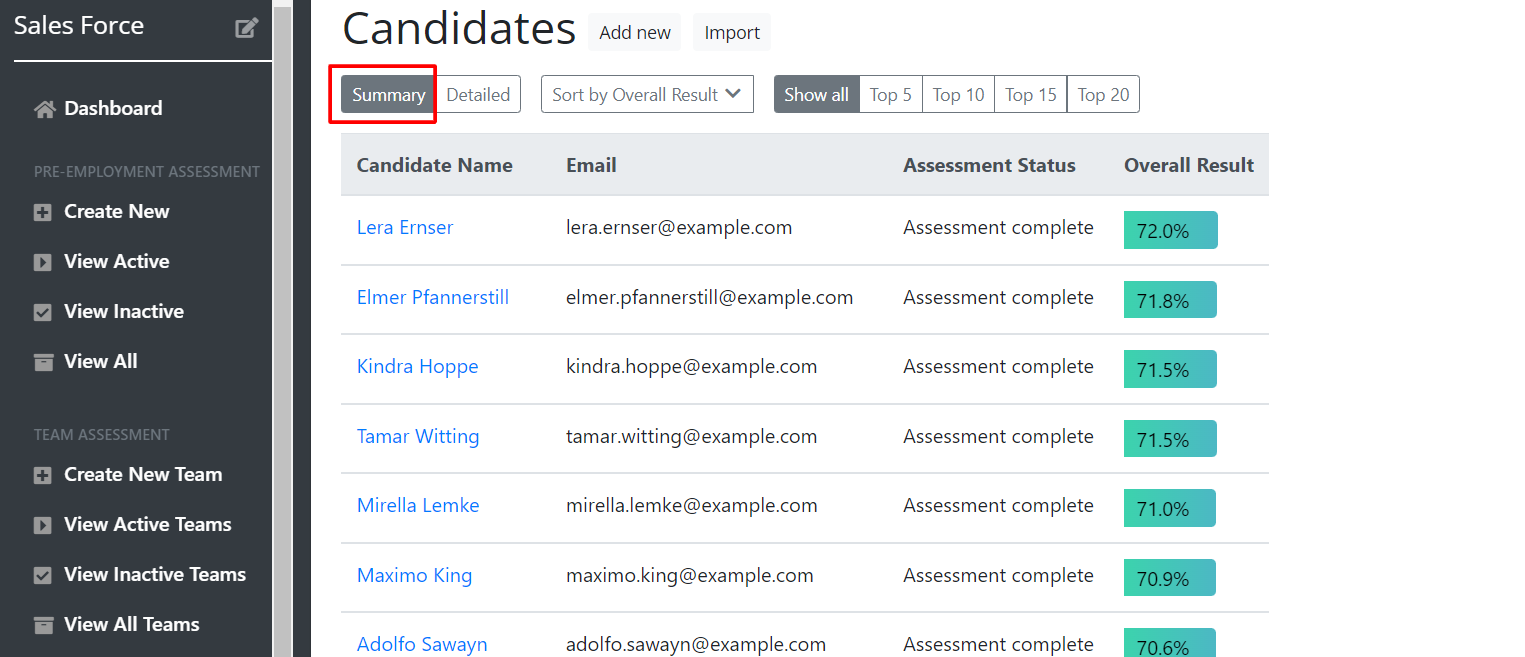
Or get more granular with the detailed view:
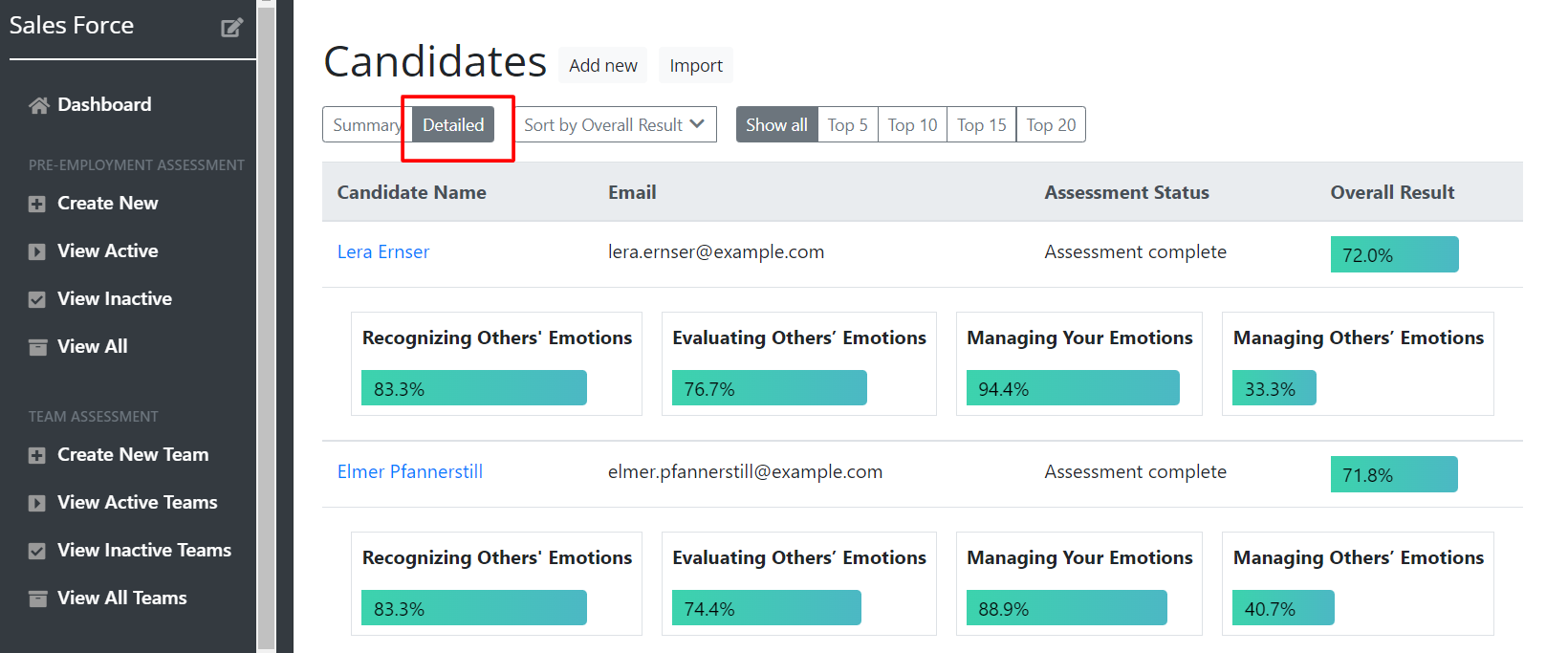
This detailed view of an applicant across the four areas of emotional intelligence can help HR professionals and PM team leaders make more informed hiring decisions.
Emotional Intelligence in Action: Real-World Examples
Let’s discuss a few scenarios related to Project Management where Emotional Intelligence comes into play.
New Product Development
Think about a scenario where a tech company is developing a new product.
A high EQ project manager will be able to build strong relationships with team members and stakeholders, communicate effectively, and manage conflict constructively.
As a result, the project would be completed on time and within budget, with high levels of stakeholder satisfaction.
Construction Project
Emotional intelligence can also go wrong in project management.
Let’s assume a project in the construction industry, where the project manager lacked emotional intelligence competencies such as self-awareness and self-regulation.
This could lead to poor communication, mismanaged conflicts, and low team morale. The project would be delayed. It would go over budget, resulting in stakeholder dissatisfaction.
Organizations Using EI in Project management
Several forward-facing businesses have recognized the importance of emotional intelligence for project managers. And have implemented strategies to assess and develop emotional intelligence competencies among their project managers.
The Search Engine leader has implemented an emotional intelligence training program for its employees, including project managers, to help them develop self-awareness, self-regulation, empathy, and social skills.
According to a study conducted by Google employees who completed the program reported improved communication and collaboration, increased job satisfaction, and reduced stress.
IBM
Project Managers, and sales and customer service teams at IBM undergo emotional intelligence training.
The organization has reported increased customer satisfaction, improved team performance, and reduced employee turnover as a result of the training.
Marriott International
Marriott International continues to invest in EQ to help project managers and other employees communicate, collaborate, and build relationships with team members and customers.
According to a study by the Consortium for Research on Emotional Intelligence in Organizations, organizations that prioritize emotional intelligence in their leaders and employees tend to have higher levels of employee engagement, customer satisfaction, and financial performance.
Organizations that invest in emotional intelligence training and coaching for their project managers tend to have higher project success rates and stronger relationships with stakeholders
Conclusion
Emotional intelligence is a critical factor for project success, and project managers who possess high levels of emotional intelligence competencies are better equipped to manage projects effectively.
Emotional intelligence helps project managers to communicate and collaborate effectively, manage risks, and build strong relationships with stakeholders.
Organizations should prioritize emotional intelligence assessment and development for project managers to ensure that their teams are set up for success.
By investing in emotional intelligence training and coaching, organizations can help project managers to develop and improve their emotional intelligence competencies, leading to more successful project outcomes and greater stakeholder satisfaction.
Organizations that prioritize emotional intelligence for project managers’ training and growth can gain a competitive advantage in today’s fast-paced and ever-changing business environment.
FAQs
Here are some frequently asked questions related to emotional intelligence for project managers.
What is an emotional intelligence assessment?
An Emotional intelligence assessment like EQMatch evaluates an individual’s emotional intelligence competencies.
How can I improve my emotional intelligence in project management?
Self-reflection, seeking feedback, practicing mindfulness, developing empathy, improving communication and conflict management skills, and participating in emotional intelligence training and coaching can help improve EQ.
What are the benefits of emotional intelligence in project management?
Emotional intelligence can result in improved communication and collaboration, better risk management, increased stakeholder satisfaction, stronger team relationships, and greater adaptability and resilience in the face of change.
Can emotional intelligence be learned or developed?
Yes, emotional intelligence can be learned and developed. While some individuals may naturally possess higher levels of emotional intelligence, it is a set of skills that can be developed and improved over time through training, coaching, and intentional practice.
Is emotional intelligence more important than technical skills in project management?
While technical skills are certainly important in project management, emotional intelligence is equally important in many ways. EQ enables project managers to effectively communicate and collaborate with team members and stakeholders, manage conflicts and risks, and build strong relationships. Without emotional intelligence, technical skills alone may not be sufficient to ensure project success.


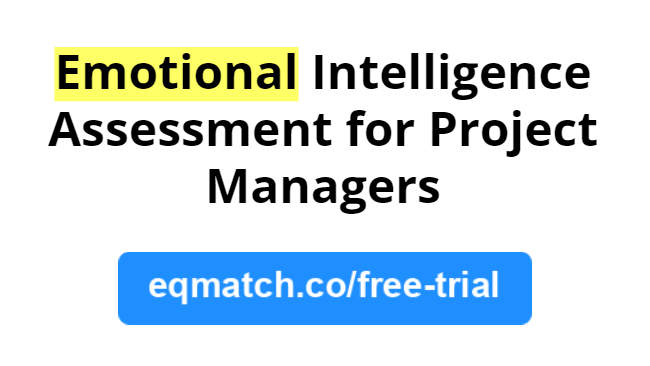
No responses yet